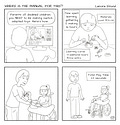The second Sunday of every month Medical Motherhood publishes Where Is the Manual for This?!, an editorial cartoon by Lenore Eklund.
How many times has this happened to you?? Personally, I’ve gotten a little gun shy about adaptive equipment and now demand to try it out before we go through the effort!
Medical Motherhood’s news round up
Snippets of news and opinion from outlets around the world. Click the links for the full story.
• From Psychology Today: “The Damage Caused by Infantilizing the Disabled”
[Dr. Kenneth L. Robey, author of, Implicit Infantilizing Attitudes About Disability, says there are four reasons why parents or caregivers might infantilize disabled people:]
Implicit associations. We all carry unconscious, implicit associations or attitudes that impact our interactions with others. This implicit “infantilizing” influences the behaviors not only of people who have little exposure to those with disabilities, but the behaviors of parents and caregivers with considerable exposure to people with disabilities.
Parental caring and protectiveness. As parents, we seek to protect our children, including our adult children, from harm and young people who do have disabilities might be particular targets of this desire to protect. Our protective instincts are strongest when responsible for caring for those who have either real or imagined fragility.
Guilt. Parents of children with disabilities often experience uncertainty, whether rational or irrational, of whether their child’s disability is related to their own actions or inactions. An enhanced sense of protectiveness might be a compensation for that sense of guilt.
Cultural norms. There are dramatic cultural differences in how disability is viewed and addressed, ranging from cultures where disability is believed to be a punishment for the sins of family members or ancestors, to cultures where disability has very little stigma or expectation of functional limitation. Cultural background can be a strong influence on how parents and caregivers transition from a relationship of dependence to one of interdependence.
• From Mother Jones: “Inside the Kafkaesque Process for Determining Who Gets Federal Disability Benefits”
A disability appeal hearing can seem surreal to an outsider. Unlike a court proceeding, it involves little storytelling or persuasion. And it’s only glancingly related to a claimant’s experience of impairment. “Disabled is a legal term, not really a medical term,” says Amy Vercillo, a vocational counselor and long-time SSA vocational expert. The government’s definition of a disability requiring compensation is agonizingly specific, focusing on the minutiae of how an impairment changes a person’s capacity to, say, reach forward, bend over, or lift 10 pounds. ALJs [Administrative Law Judges] are tasked only with determining whether the claimant fits that definition. The objective fairness of the outcome depends entirely on how well the judge, vocational expert, and claimant’s representative—if they have one; it needn’t be a lawyer—can describe the claimant’s disability in bureaucratic doublespeak.
[…]Reversing a denial of benefits can take years, even for an experienced lawyer. A 2014 study found that more than 60 percent of claimants denied at the hearing level were eventually awarded benefits. That’s partly because people’s disabilities often get worse over time, but also because the government is so hard to convince—that skepticism is predicated on assuring that taxpayer money goes where it’s deserved, with the expectation that well-intentioned experts, fluent in the language of bureaucracy, will make the decision. When that ideal breaks down, people like [Pennsylvania resident Albert] Diaz end up lost in an interminable nightmare of what looks an awful lot like bureaucratic evasion and nonsense.
• From the Ghanaian Times: “Let’s empower mothers with disabled children”
There is the need for the empowerment of mothers with disabled children while discouraging stigmatisation against such women, to reduce instances of depression and poverty among them.
“Caring for children or individuals with severe disabilities, especially in our part of the world comes with many problems, as some people believe that Persons With Disabilities (PWDs) are cursed and therefore associating with them or their families meant exposing oneself to bad omen, which is false.”
The founder of Women With Vision (WWV), a women and child centred not for profit organisation [sic], Ms Sylvia Appiah made the assertion in an interview with the Ghanaian Times in Accra yesterday.
According to her, many mothers with disabled children suffered depression due to the emotional trauma they suffered in the hands of their superstitious neighbours whose cold attitudes towards them are fueled by certain traditional [beliefs].
Explaining, she indicated that the stigmatisation against childhood related disability was often associated with women’s role in child bearing and upbringing, adding that poverty also played a role in promoting discrimination against mothers with such children.
Medical Motherhood brings you quality news and information each Sunday for raising disabled and neurodivergent children. Get it delivered to your inbox each week or give a gift subscription. Subscriptions are free, with optional tiers of support. Thank you to our paid subscribers!
Follow Medical Motherhood on Facebook, Twitter, TikTok, Instagram or Pinterest. The podcast is also available in your feeds on Spotify and Apple Podcasts. Visit the Medical Motherhood merchandise store.
Do you have a story to share or an injustice that needs investigation? Tell me about it and it may become a future issue.
















DIY hell: When adaptive equipment isn't worth the effort